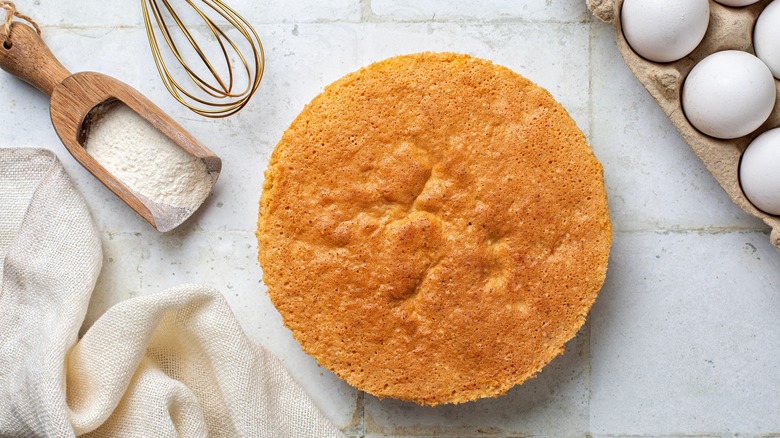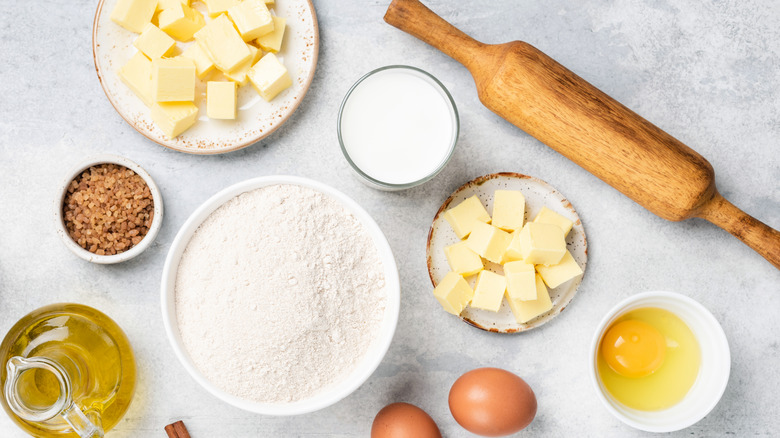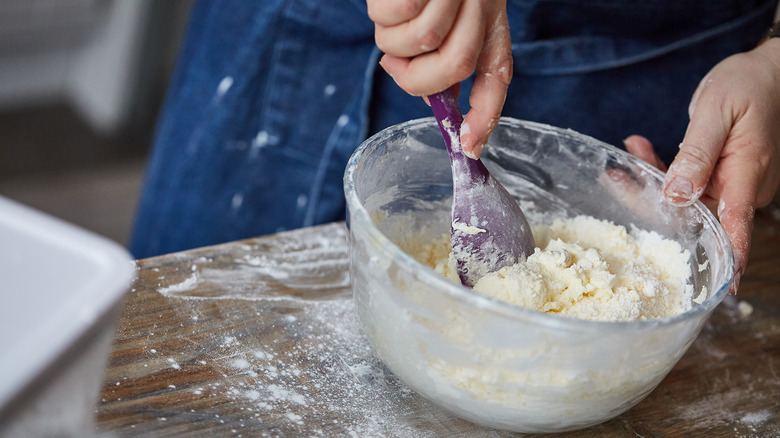The Top 3 Mistakes To Avoid When Baking Cakes, According To An Expert
Forgotten ingredients or hurried preparations can turn a spongy slice of sweetness into a less-than-desirable mound of dense, too-chewy dessert. As you set out to make a delicately decadent chocolate layer cake to serve at this weekend's party, we have a few tips that can up the chances that your finished cake is one you can present with pride. Even a simple honey cake can be transformed by the steps you take throughout the cake-making process.
Thanks to recipe developer and artist Jerrelle Guy, the likelihood of us pulling spongier, fluffier, lighter, and better-tasting cakes out of our ovens is much higher. Not only has Guy received a Masters in Gastronomy from Boston University, she is the author of the James Beard nominated "Black Girl Baking: Wholesome Recipes Inspired by a Soulful Upbringing" and one of the brains behind Chocolate for Basil. She cranks out weekly recipes in her newsletter The Dinner Ritual and has a new cookbook in the works. If anyone knows the top three mistakes we should avoid when making our butter pecan cake recipe, it is Guy.
Using expired leaveners
As chefs go about collecting ingredients and survey recipe instructions, Guy offers a helpful reminder to check expiration dates. A premature inclusion of an expired product can thwart earnest cake-making attempts before any batter is set into a warm oven to rise. Leaveners, in particular, can be sneaky culprits — and become instant deal breakers in the kitchen.
Leaveners are common baking ingredients essential to the texture and overall finish of baked goods. Whether you are using baking powder or baking soda, these substances help lift the dough. "Test the leavener first with a little vinegar in a small bowl. If it bubbles, it's active and good to use," Guy advises. You can also pour boiling water over a half teaspoon of baking powder to see if it interacts. Baking powder and baking soda generally have a shelf life of six months when stored in cool, dry spaces. Should your baking soda fail the freshness test, you can still use it for household cleaning purposes, just keep it out of your culinary projects.
Improper incorporation of the leaveners
Once you are confident that your chosen ingredients are indeed lively and fresh, you can get to work mixing and adding them to make batter for your death by chocolate cake. "Mix the flour and leaveners together well by sifting them together first," Guy suggests. While this extra step may seem laborious and unnecessary, you'll notice a difference in the overall finish of the cake once it is baked. If your goal is to set a fluffy cake on the table that gives way to forks and knives, sifting is a step you don't want to miss.
Sifting flour not only mixes dry ingredients but also filters and aerates them, resulting in a combination of powdery substances that are evenly textured, light, and better able to mix into the cake batter. It might seem inconsequential, but even professional chefs have remarked on the difference sifting can make in perfectly textured desserts. If you don't have a sifter in your kitchen, use a fork, wire whisk, or strainer.
Improper mixing of the batter
Finally, Guy cautions that improperly mixing batter can be a deal breaker for any cake recipe. "Make sure your ingredients are at room temperature, and mix them in the order suggested by the recipe," she instructs. Instead of stirring, consider using your blender on low speed and watching the ingredients come together. And it isn't just the ingredients, but the equipment you use that deserves your attention.
"Make sure all your tools are dry when mixing the dry ingredients," Guy adds. A wet spoon or whisk can inadvertently bring in moisture you don't want before they are combined with the wetter items on your ingredient list. As a final step before your cake is ready to bake, Guy reminds at-home bakers to stop when enough is enough. "Don't overmix the batter otherwise your cake will be tough," she encourages. Overmixing can over-activate some of the ingredients in your dough, turning your cake into a sturdier baked good, like a dough. If you're making denser bread, overzealous mixing attempts may serve you well, but for delicate cakes, you may want to show some restraint.



